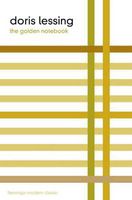I bought a copy for myself ages ago. I often weigh it in my hands, with a sense that it has a secret to tell me which I'm not yet equipped to handle. It will reveal mysteries to me. I've never glanced inside. I didn't feel ready.
It's been increasingly on my mind in recent months. My eyes rest on it more frequently. Now — soon, this summer — is the time.

The Golden Notebook, by Doris Lessing.

There's a couple books I'd like to get through before I tackle this one, but I sat down to read the Doris Lessing's 1971 preface to this 1962 novel the other night.
"This novel was not a trumpet for Women's Liberation." Its theme, breakdown as a means of self-healing, was, she claims, barely noticed.
To be honest, I know nothing about this book, its plot or themes. I thought it was a kind of feminist manifesto. Hmmm.
Lessing addresses some of the decisions that went into creating The Golden Notebook: the ideological "feel" of the midcentury, why her main character must be an artist, the shape of the book.
The problem of subjectivity:
At last I understood that the way over, or through this dilemma, the unease at writing about 'petty personal problems' was to recognize that nothing is personal, in the sense that it is uniquely one's own. [The tiny individual is a microcosm.] Growing up is after all only the understanding that one's unique and incredible experience is what everyone shares.
Perhaps, then, I am a grown-up.
Lessing lambastes literary critics, but also the education system; more broadly, she explores the problem of parochialism in our culture, institutionalization and indoctrination. Just as a preface.
The other thing taught from the start is to distrust one's own judgement. Children are taught submission to authority, how to search for other people's opinions and decisions, and how to quote and comply.
(This is what I hated about university. I was not being encouraged to think; it was important only that I knew what other people had thought.)
Lessing writes also of the multiplicity, and validity, of perceptions and interpretations:
It is not only childish of a writer to want readers to see what he sees, to understand the shape and aim of a novel as he sees it — his wanting this means that he has not understood a most fundamental point. Which is that the book is alive and potent and fructifying and able to promote thought and discussion only when its plan and shape and intention are not understood, because that moment of seeing the shape and plan and intention is also the moment when there isn't anything more to be got out of it.
There is much more that is quotable, but you'd do better to go find a copy of the preface and read it for yourself. I agree with most of what Lessing has to say; she is sensible; her writing on these subjects engages me.
The preface bodes well for the book.
There is only one way to read, which is to browse in libraries and bookshops, picking up books that attract you, reading only those, dropping them when they bore you, skipping the parts that drag — and never, never reading anything because you feel you ought, or because it is part of a trend or a movement. Remember that the book that bores you when you are twenty or thirty will open doors for you when you are forty or fifty — and vice-versa. Don't read a book out its right time for you. . . . Everywhere, if you keep your mind open, you will find the truth in words not written down. So never let the printed page be your master. . . . [Y]ou should have been taught to read your way from one sympathy to another, you should be learning to follow your intuitive feeling about what you need: that is what you should have been developing, not the way to quote from other people.
I am ready.


2 comments:
Okay, I'm interested (the article in which she mentions Dickens was not enough, apparently...). Where would you recommend one start with Lessing? Or should I take her advice and just see what grabs me?
See what grabs. Her advice is far sager than anything I could offer.
I first read Lessing for a course in dystopian fiction. The Marriages between Zones Three, Four and Five. Can be read independently of the others in the SF-ish series.
The Fifth Child. Read it ages ago but it haunted me throughout my pregnancy – what if the kid is born bad? Mother's capacity to love a "bad" child. (Sequel not very strong.) Also, it's very short.
The Good Terrorist. How a political activist loses the forest in the trees (or is that vice versa?).
Mara and Dann is my reigning favourite.
Others swear by the Martha Quest series, but it hasn't found its time with me yet.
Post a Comment